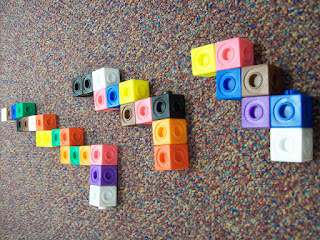 |
| https://www.flickr.com/photos/29510854@N02/3314845548 |
In this way, though, our brains are slackers - they look for ways to turn on autopilot and coast. In his book, The Power of Habit: Why We Do What We do in Life and Business, Charles Duhigg states, "Left to its own devices, the brain will try to make almost any routine into a habit, because habits allow our brains to ramp down more often" (p. 17 - 18).
Duhigg goes on to detail the story of MIT researchers in the 1990s who discovered that as rats became more familiar with a maze over time, their mental activity while navigating that maze decreased, writing, "As each rat learned how to navigate the maze, its mental activity decreased" (p. 15). Stored in the area of the brain called the basal ganglia, these patterns and habits allowed the rats to run faster and faster through the maze, while the rats' brains worked less and less.
Duhigg describes this process as chunking - when the "brain converts a sequence of actions into an automatic response" (p. 17). This chunking is vital to the educational process. It's what allows emerging readers to blend fluently during decoding. It's what allows us to memorize math facts, historical events, scientific theories. It's how we perform tasks like writing with a pencil and paper, type on a computer, turn in papers - just about anything. Imagine how difficult every aspect of life would be if you performed any task as if it was the first time you were doing it!
While this chunking allows educators to scaffold skills and for students to move from basic to more complex concepts and activities, it also can lead to the formation of bad habits, careless errors, and an inability to successfully complete a procedure.
It's how your brian may not have noticed that the word brain was misspelled earlier in this sentence.
 |
| https://commons.wikimedia.org/wiki/File%3AMahan_Air_Avro_RJ100_cockpit.jpg By Mohammadreza Farhadi Aref [CC BY-SA 4.0 (http://creativecommons.org/licenses/by-sa/4.0) or CC BY-SA 4.0 (http://creativecommons.org/licenses/by-sa/4.0)], via Wikimedia Commons |
Purposefully incorporating check-points that can offer moments of metacognition, stimulation, reflection and even re-direction and clarification can help to keep students' brains appropriately engaged and active. Whether this centers on classroom management procedures or instructional activities, intentionally including check-points can help to keep students' brains engaged, enhance their self-awareness and can help fight against the lethargy and errors that result from auto-pilot-syndrome.
This is not to say that every moment within a classroom needs to be amusement-park-engaging. In fact, it shouldn't be. But, it is to say that we must build students' capacities for work by offering to them frequent check-points that can help them to process, that can help scaffold complex tasks and concepts, and that can re-activate their brains for learning.
As a Catholic, creating habits of prayer and spiritual activity are essential in our walk of faith. However, we can become so set in our habits that we can start to automatize our faith. Mass becomes a Sunday stop on the way to other activities, the Rosary just a recitation of a script. Incorporating check-points can help to advance us on our spiritual journeys. Scheduling and taking a retreat, speaking with a spiritual advisor or trusted mentor, or just taking time to reflect on your faith-life and its overall health can keep you from falling into the habits of wandering aimlessly or remaining stagnant - despite some hearty activity - in your faith.
When we workout, though, we often just go through the motions and endure to the end of the session to cross it off of a list. There is often no growth or progress. There's no need for a check-point, because there really isn't a destination.
In our classrooms and our lives, keep training.
Keep pushing.
Keep moving forward, but not without stopping to check that you and your students are on the right path.
Because getting to the destination, well, that's the point.
Duhigg, C. (2014). The Power of Habit: Why We Do What We Do in Life and Business. New York, NY: Random House Trade Paperbacks.